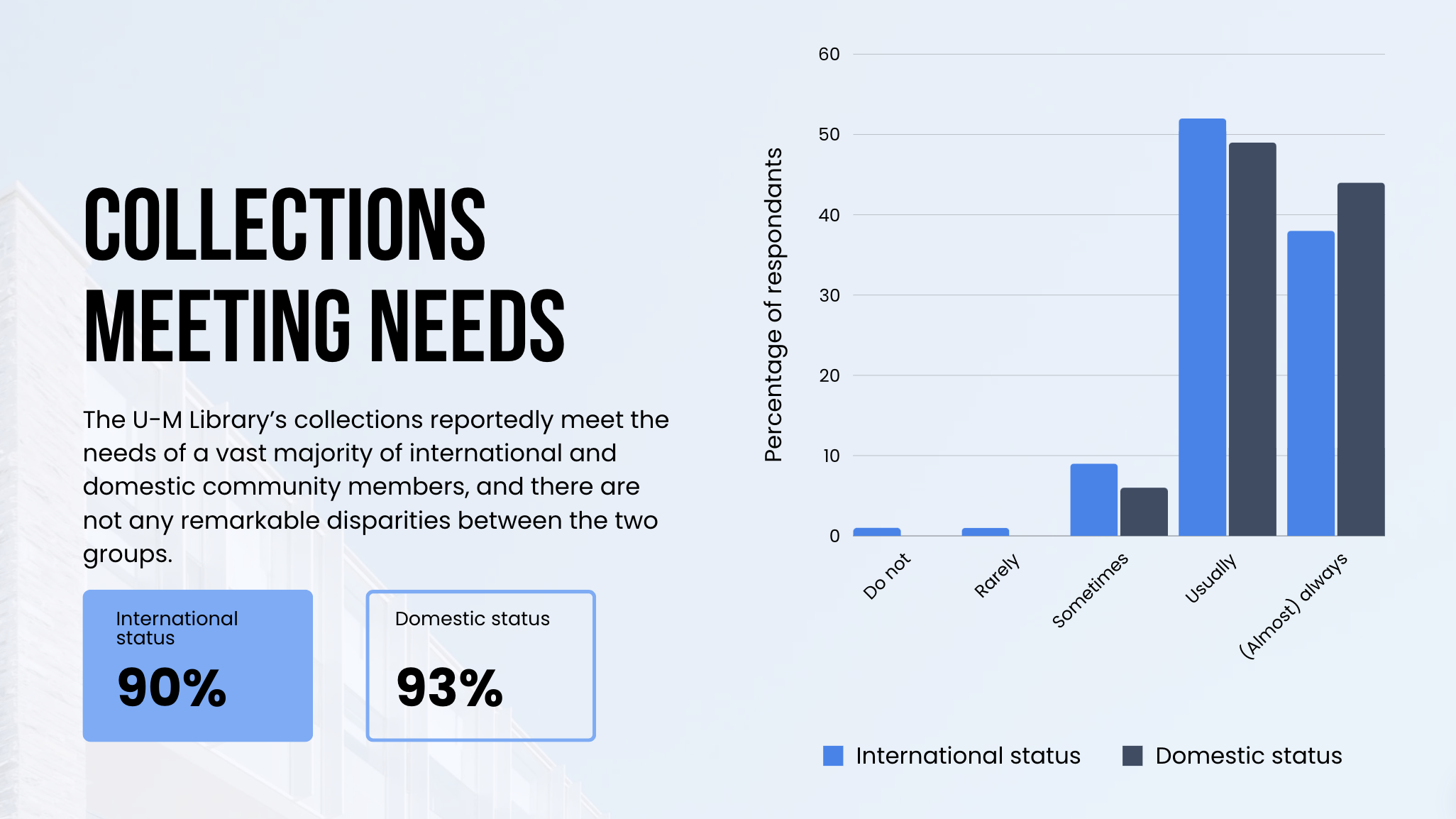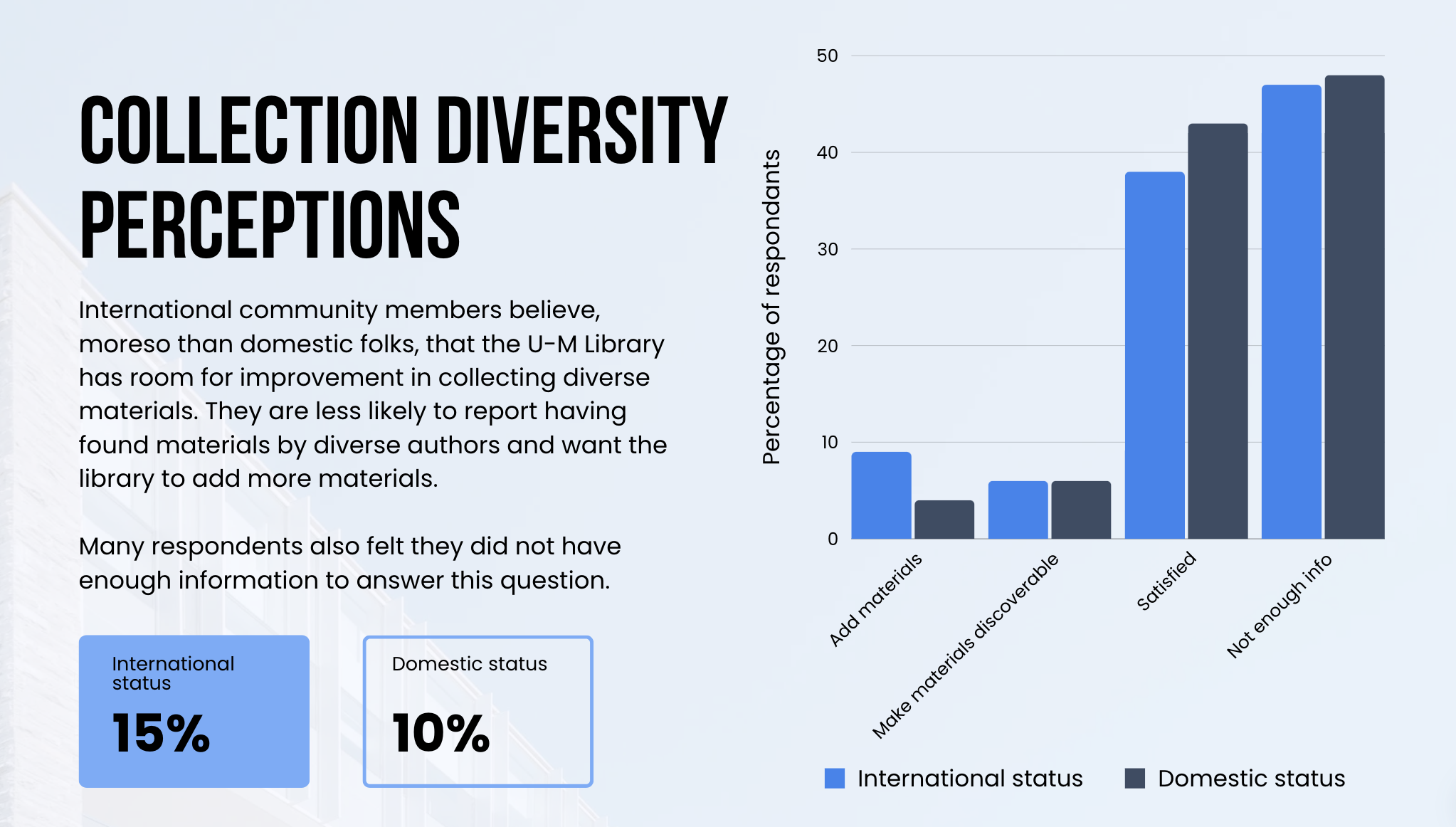When I read the description of the Summer 2024 Michigan Library Scholars (MLS) Projects, I was incredibly excited to see a project that seemed to match my interests and desired skill set perfectly. The project was “How Do International Students Experience the U-M Library? An Exploration Using the Library’s 2023 Survey Data”, and it combined my interest in doing research to create concrete change and improve the experiences of marginalized groups with my personal goal of getting more statistics experience before applying to graduate schools. I’m a Psychology major, with Spanish Language, Literature, and Culture and Crime and Justice minors. I’m applying to doctoral programs in psychology this fall because I’m interested in continuing to conduct research and become a professor. I’m very grateful to be a part of MLS this summer on the “How Do International Students Experience the U-M Library” project, and this is what my experience has been like.
The Project
In 2023 the University of Michigan (U-M) Library conducted a campus-wide survey for the first time. Over 15,000 people responded, including undergraduates, graduate students, faculty, staff, and other affiliates. Respondents were asked about their experiences and needs related to library spaces, services, and materials. In this project we were specifically interested in how international students experience the libraries, and what needs international students share and don’t share with students born in the United States. The aims of this project are to yield concrete findings to specific research questions and produce recommendations for the U-M Library so we can learn how to more effectively serve international students and make the libraries more inclusive, accessible, and useful spaces for all.
My personal learning objectives for this project were to learn how to conduct basic quantitative statistical analyses and how to work with large amounts of qualitative data. I also aimed to create a deliverable to disseminate key findings broadly and/or to important stakeholders. My deliverables for the project consist of this blog post and a final presentation, which I will present in front of other interns, library staff, and invited guests. I will essentially share what I learned over the course of my summer internship, similar to this blog post. You can find my presentation slides preserved in Deep Blue, the University of Michigan’s digital repository. I am additionally working on a manuscript to hopefully publish in a library-related journal in the future.
My Contributions
I worked with Craig Smith, my mentor and the U-M Library’s Assessment Specialist, and Mai Tran, another intern on the same project. Mai and I created our own independent projects answering more narrow research questions with the support of Craig. The dataset is very extensive, but I determined the specific research question I wanted to pursue this summer was “Do the U-M libraries meet international community members’ needs in regards to the content and accessibility of library collections?”. I determined that international and domestic community members use the library collections at similar rates, but use different collection areas. For example, international folks use the engineering and mathematics and sciences collections at higher rates than domestic folks, but domestic folks use the social sciences collection more than international folks. I found that the collections are primarily accessible to all in multiple formats (physical and electronic), and people generally felt that the collections meet their needs.

Figure 1. Slide from final presentation about collections meeting needs statistics.
Additionally, international community members feel slightly more than domestic community members that the U-M Library has room for improvement in collecting diverse materials. 15% of international respondents felt the library needs to add materials or make materials more discoverable as opposed to only 10% of domestic respondents. While 5% is not a massive disparity, it is meaningful and should not be ignored.

Figure 2. Slide from final presentation about collection diversity perceptions statistics.
These findings signal to me that the library should listen to its constituents and strive to diversify its collections more through acquiring more materials in different languages, from authors in different countries, and so on. The library may also benefit from advertising its diversity more, as people may just have trouble finding diverse materials even if they are acquired by the library.
Growth and Learning
I improved my statistics skills through working with SPSS during this internship, and improved my writing and presenting skills by preparing my research to share with others. I also learned how to qualitatively code using generative AI (UM-GPT), which expanded upon my existing qualitative coding skills. I found that I grew a lot throughout the course of the MLS summer internship experience. I feel like I strengthened some of my specific skills, and I built resilience by experiencing setbacks so I can bounce back from challenges more easily in the future. I became more aware of my opportunities for growth too, as it became very apparent starting this project that I had difficulty with project management and explaining my project clearly to others. These became points I intentionally tried to improve, and I kept track of them by writing daily reflections about my MLS project work.
My role as a MLS intern for this specific project felt like it aligned closely with my personal values and interests. I care about grounding my research in actual peoples’ experiences and I most enjoy doing research that can inform interventions, like, for example, being able to disseminate my findings to the U-M Library and academic libraries around the country to improve their services for international constituents. The project also aligned with my skill set really well. I came into the project with the right abilities and skills to be able to get off to a running start and not have many difficulties in acquiring the theoretical background or formulating a research question, but I also had a lot of room for improvement in learning statistics and conveying my findings effectively. This made MLS a really satisfying summer internship for me because I felt like I was in control of my project the entire time, but I still learned and grew along the way.
My Michigan Library Scholars experience is highly related to my plan to apply to doctoral programs in psychology this fall, and it has helped inform what I may want to do with my degree after completing a Ph.D. program. Through MLS I have acquired very useful skills to make me a competitive candidate for doctoral programs, and I also believe these skills will help me thrive in a program too. I have been interested in becoming a professor with my Ph.D., but now I may consider a role in an academic library because it’s a very interesting field that I wasn’t aware of before. My success in this internship doesn’t necessarily guarantee competency in an academic library role, but I hope the skills I’ve developed and experiences I’ve had make me a better candidate for a career in the field of library and information science.
Impact
As I’ve already stated, the impact of my work is very important to me. I recognize that these findings are bigger than just my participation in an internship program. I hope they can be wielded by the U-M Library to improve the experience of all library-goers, especially international folks. In the fall I will continue to work on a manuscript from my project this summer in order to try to publish and disseminate my findings to larger audiences. If you’re interested in my work, you can find my MLS final presentation slides preserved in Deep Blue for more findings.